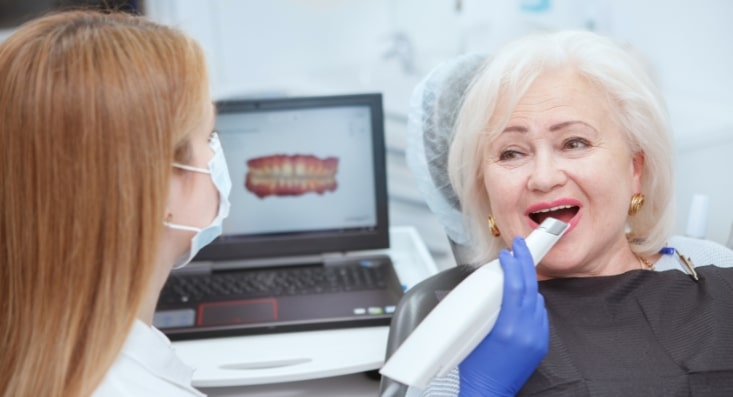ONLINE SCHEDULING AND VIRTUAL CONSULTS AVAILABLE

7 Tips For Safely Healing Your Dental Implants

Getting dental implants is a fantastic step toward a healthier, more confident smile. However, the journey doesn’t end once the procedure is complete. Proper healing is crucial to ensuring that your implants integrate seamlessly with your jawbone and last for years to come. That’s where effective aftercare plays a vital role.
To help you navigate this crucial phase, we’ve compiled seven essential tips for healing your dental implants safely. From sticking to a soft-food diet to managing swelling and following your dentist’s post-op instructions, these tips will set you up for a smooth recovery.
By paying close attention to these guidelines, you can enjoy the long-term benefits of your implants and avoid potential complications. So, let’s dive into these tips and get you on the path to a successful recovery!
1. Follow Your Dentist’s Instructions Religiously
After your dental implant procedure, your dentist will provide specific instructions to aid your recovery. Adhering to these guidelines is essential for a successful healing process.
- Medication: Take prescribed painkillers and antibiotics as directed to manage pain and prevent infection.
- Oral Care: Avoid brushing or flossing the implant site until your dentist confirms it’s safe. Follow their advice on when to resume regular oral hygiene practices.
- Activity: Refrain from vigorous activities that might disturb the implant site. Resting allows your body to heal properly.
2. Maintain a Soft-Food Diet Initially
What you eat post-surgery can impact how well your implants heal. A soft-food diet minimizes irritation and stress on the healing area.
- Soft Foods: Opt for mashed potatoes, yogurt, soups, and smoothies. These foods require minimal chewing and are less likely to cause discomfort.
- Avoid Hard Foods: Stay away from crunchy or sticky foods that might dislodge or put undue pressure on the implants.
- Hydration: Drink plenty of fluids, but avoid hot beverages as they can exacerbate swelling.
3. Manage Swelling and Discomfort with Care
Swelling and discomfort are common after dental implant surgery, but proper management can help ease these symptoms.
- Ice Packs: Apply ice packs to your face in 15-minute intervals to reduce swelling. Avoid direct contact with the skin to prevent frostbite.
- Elevation: Keep your head elevated, especially when lying down, to minimize swelling.
- Over-the-Counter Pain Relief: Use over-the-counter pain relievers as directed by your dentist to manage discomfort.
Effective management of swelling and discomfort will enhance your overall comfort and speed up your recovery.
4. Avoid Smoking and Alcohol
Smoking and alcohol can interfere with the healing process of your dental implant Plantation. Here’s why you should avoid them:
- Smoking: Tobacco reduces blood flow and can hinder the healing of gum tissue around the implants. It also increases the risk of infection.
- Alcohol: Alcohol can interact with medications and increase the risk of bleeding. It also can dry out the mouth, impairing the healing process.
5. Keep the Implant Site Clean but Be Gentle
Maintaining oral hygiene is crucial to prevent infection and ensure the longevity of your dental implants.
- Gentle Brushing: Use a soft-bristled toothbrush to clean your teeth, avoiding the implant area until your dentist gives the go-ahead.
- Mouthwash: Rinse with an antibacterial mouthwash to help reduce bacteria and promote healing.
- Flossing: Once your dentist approves, floss carefully around the implant site to remove plaque and food particles.
6. Schedule Follow-Up Appointments
Regular follow-up appointments with your dentist are vital for monitoring the progress of your recovery.
- Check-Ups: Attend all scheduled appointments to allow your dentist to assess the integration of the implant and overall healing.
- X-rays: Your dentist may take X-rays to ensure the implant is properly integrating with the jawbone.
- Adjustments: If needed, your dentist will make adjustments to ensure the implant is functioning correctly.
7. Be Patient and Avoid Strain on the Implant
Healing from dental implant surgery takes time, and patience is key to a successful recovery.
- Initial Healing: Expect initial discomfort and swelling to subside within a few days, but complete healing may take several months.
- Long-Term Care: Continue following your dentist’s care instructions and avoid rushing back into normal eating and drinking habits.
- Listen to Your Body: If you experience any unusual symptoms or prolonged pain, contact your dentist promptly.
Healing your dental implants requires attention and care, but following these tips will guide you towards a successful recovery. From sticking to soft foods to maintaining impeccable oral hygiene, each step plays a crucial role in ensuring your implants integrate seamlessly. Patience is key; trust the process and allow your body the time it needs to heal. With the right care, your dental implants will not only enhance your smile but also support long-term oral health.





